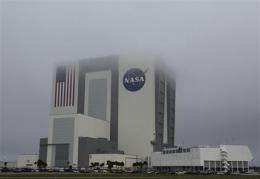Rain, overcast sky delay space shuttle's return

(AP) -- Rain and overcast skies prevented space shuttle Discovery from returning to Earth on Monday, and Mission Control instructed the astronauts to spend a 15th day circling the world and awaiting better weather.
Mission Control radioed up the disappointing news after passing up two landing attempts.
"The folks really worked it hard down here. There was a lot of cause for optimism ... but in the end of the day" the clouds remained too low and too thick, Mission Control radioed.
"We appreciate everything you've done," replied shuttle commander Alan Poindexter, "and we'll be hopeful for better weather tomorrow." He urged flight controllers to get some rest.
Clearer skies are expected over Kennedy Space Center on Tuesday. If the clouds linger, however, NASA will try for the backup landing site in Southern California. The first landing opportunity is at 7:34 a.m., shortly after sunrise in Florida.
Discovery and its seven astronauts can remain in orbit until Wednesday. They're wrapping up a resupply mission to the International Space Station.
If Discovery aims for Kennedy, it should provide a rare visual treat. The streaking, glowing trail will be visible from below, weather permitting, as the shuttle zooms down the Eastern Seaboard toward Cape Canaveral.
The last time a returning shuttle flew over a large portion of the United States was in 2007. No further re-entries like this are planned as the shuttle program draws to a close. NASA has tried to keep continental flyovers to a minimum for public safety reasons, ever since space shuttle Columbia shattered over Texas in 2003.
Typically, a shuttle returns from the southwest, zooming up over the South Pacific, Central America, and the Gulf of Mexico. NASA changed Discovery's flight path before liftoff on April 5, to maximize the crew's work time in orbit and reduce fatigue. Monday's landing attempts would have had Discovery crossing North America, coming in from the Pacific Northwest.
A touchdown at Edwards Air Force Base in California would eliminate a coast-to-coast flyover.
The volcanic eruption in Iceland, at least, was not interfering with NASA's effort to bring Discovery home. The re-entry path does not go anywhere near the European airspace threatened by volcanic ash.
Discovery undocked from the space station Saturday, leaving behind tons of science experiments and equipment so the orbiting outpost can operate for years to come. The astronauts' biggest contribution was a new tank full of ammonia coolant, which took three spacewalks to hook up.
A pressure valve in the space station's cooling system got stuck after the ammonia tank was plugged in. Astronauts will have to deal with the problem on a future spacewalk. For now, though, the lab complex is being cooled properly.
This is Discovery's next-to-last flight. NASA has only three shuttle flights left before retiring the fleet. Atlantis is next up in less than four weeks. The final shuttle mission - by Discovery - is scheduled for September.
©2010 The Associated Press. All rights reserved. This material may not be published, broadcast, rewritten or redistributed.





















